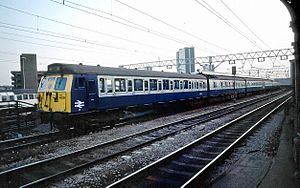British Rail Class 305 facts for kids
Quick facts for kids British Rail Class 305 |
|
|---|---|

A failed (broken down) Class 305 train at platform 8 of Stratford station. In the background can be seen part of a London Transport Central Line 1962 stock tube train.
|
|
| In service | 1960 - 2002 |
| Manufacturer | BR York/Doncaster |
| Number built | 71 trainsets |
| Formation | 3/4 cars per trainset |
| Capacity | 272 seats |
| Operator(s) | British Rail |
| Specifications | |
| Maximum speed | 75 mph (121 km/h) |
| Weight | 118 t |
| Electric system(s) | 25 kV AC Overhead |
| Track gauge | 4ft 8.5in (1,435 mm) |
The British Rail Class 305 was a special type of train known as an electric multiple unit (EMU). These trains ran on alternating current (AC) electricity. An EMU is a train made of several cars that can all move on their own, without needing a separate engine. They are powered by electricity.
Before 1973, British Rail used a different way to name their trains. The Class 305 was known as AM5 back then. Later, a new system called TOPS (Total Operations Processing System) was started. This system gave trains new numbers, and that's when the AM5 became known as the Class 305.
Contents
Discovering the Class 305 Train
The Class 305 was an important part of Britain's railway system for many years. These trains were designed to run on electricity, which made them quieter and cleaner than older steam or diesel trains. They helped people travel across different parts of the country.
How the Class 305 Was Built
These trains were built by British Rail at their factories in York and Doncaster. A total of 71 train sets were made. Each train set could have either three or four cars linked together. This allowed them to carry many passengers at once.
When the Class 305 Was Used
The Class 305 trains started running in 1960. They served passengers for a long time, right up until 2002. That's over 40 years of service! They were a common sight on many railway lines during those decades.
Key Features of the Class 305
The Class 305 trains had some interesting features:
- Power Source: They used 25 kV (kilovolts) of AC electricity. This power was collected from overhead lines, which are wires above the tracks.
- Speed: These trains could reach a top speed of 75 mph (about 121 kilometers per hour). This was quite fast for passenger trains of their time.
- Weight and Capacity: Each train set weighed about 118 tonnes. They could carry up to 272 seated passengers, making them great for busy routes.
- Track Size: The trains ran on a standard gauge track, which is 4 feet 8.5 inches (1,435 mm) wide. This is the most common track width in many parts of the world.
Images for kids
 | Tommie Smith |
 | Simone Manuel |
 | Shani Davis |
 | Simone Biles |
 | Alice Coachman |


